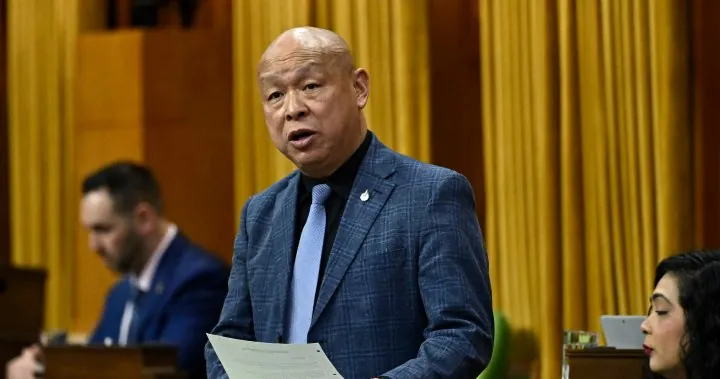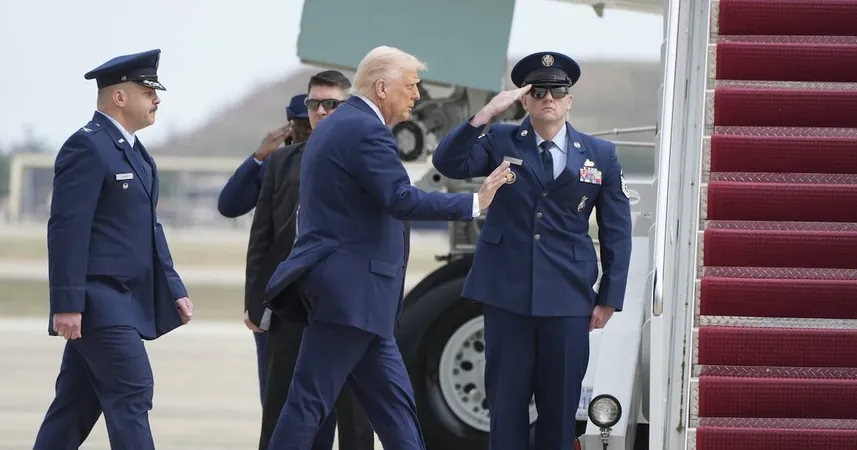
Japan's Economy on Edge as Trump Proposes Steep Tariffs on Auto Imports
2025-03-29
Author: Emily
Japan's Economy on Edge as Trump Proposes Steep Tariffs on Auto Imports
In a move that has sent shockwaves through the Japanese auto industry, U.S. President Donald Trump has announced that starting April 2, a staggering 25% tariff will be applied to all imported vehicles sold in the United States. This announcement has drawn sharp criticism and concern from the Japanese government, which is now urgently seeking an exemption for its car manufacturers.
Prime Minister Shigeru Ishiba voiced discontent with the proposed tariffs, emphasizing their potential detrimental impact on Japan's economy. Currently, vehicles and related sectors represent nearly one-third of Japan's exports, contributing significantly to the nation's employment—about 8% of jobs—relying directly on the automobile industry.
Fujitsu's Global Market Intelligence Unit's chief policy economist, Martin Schulz, highlighted the gravity of the situation, stating that if the tariffs take effect, Japan's economy could shrink by up to 0.2%. He warned that prices for vehicles could surge, placing the burden on consumers and potentially leading to decreased demand as drivers reconsider their choices amidst rising costs.
The complexities of the automotive supply chain further complicate matters. Many Japanese manufacturers have made significant investments in production facilities in Mexico and Canada with the understanding that trade with the U.S. would be seamless. Trump's protective stance disrupts this framework, causing concern among companies that now face uncertainty in their business models.
While automakers have remained largely silent on the issue—likely aimed at avoiding further conflict with the Trump administration—there is an underlying tension as Japan attempts to navigate its relationship with the U.S. Prime Minister Ishiba has previously engaged in what Japan deemed productive talks with Trump, but the recent tariff news has left many questioning the nature of that relationship.
To bolster their case, Japanese officials, including Chief Cabinet Secretary Yoshimasa Hayashi, have reiterated Japan's significant contributions to job creation and investment in the U.S. They argue that these tariffs could risk not only the economic rapport between the two nations but also have far-reaching consequences for global trade.
In light of these developments, Japan is fervently seeking a tariff exemption, with government officials labeling the announcement as "extremely regrettable." However, experts like Schulz remain skeptical about the success of negotiations, suggesting that they are unlikely to sway Trump, who is known for his rigid stance on such matters.
The ramifications of these tariffs extend beyond Japan, potentially affecting global automotive markets. Japanese firms currently account for about 16% of U.S. vehicle imports, with South Korea trailing closely behind. Analysts project that the toll on Japan’s premier automotive manufacturers could reach an eye-watering $11.4 billion due to the tariffs.
Interestingly, not only Japan stands to suffer: U.S. consumers are anticipated to bear the brunt of this policy, as higher vehicle prices could lower demand and lead to broader economic repercussions within the U.S. Takaki Nakanishi, a prominent auto sector specialist, noted that while Japan and others may feel challenges, the ultimate losers in this scenario will be American consumers and the overall U.S. economy. He raised concerns that Trump's supporters may not fully grasp the implications until financial distress becomes visible through rising prices or stock market fluctuations.
While uncertainty looms large, there’s a glimmer of hope for negotiations, according to Nakanishi. He noted that the shifting political landscape, particularly the discord with Europe over their own trade policies, might create openings for Japan to negotiate favorable terms.
As the deadline for these tariffs approaches, the stakes have never been higher. Will Japan succeed in persuading the U.S. to exempt them, or will the trade relationship spiral into a punitive cycle? The world is watching closely as the consequences of this unfolding drama will undoubtedly resonate far beyond the shores of both nations.









 Brasil (PT)
Brasil (PT)
 Canada (EN)
Canada (EN)
 Chile (ES)
Chile (ES)
 Česko (CS)
Česko (CS)
 대한민국 (KO)
대한민국 (KO)
 España (ES)
España (ES)
 France (FR)
France (FR)
 Hong Kong (EN)
Hong Kong (EN)
 Italia (IT)
Italia (IT)
 日本 (JA)
日本 (JA)
 Magyarország (HU)
Magyarország (HU)
 Norge (NO)
Norge (NO)
 Polska (PL)
Polska (PL)
 Schweiz (DE)
Schweiz (DE)
 Singapore (EN)
Singapore (EN)
 Sverige (SV)
Sverige (SV)
 Suomi (FI)
Suomi (FI)
 Türkiye (TR)
Türkiye (TR)
 الإمارات العربية المتحدة (AR)
الإمارات العربية المتحدة (AR)